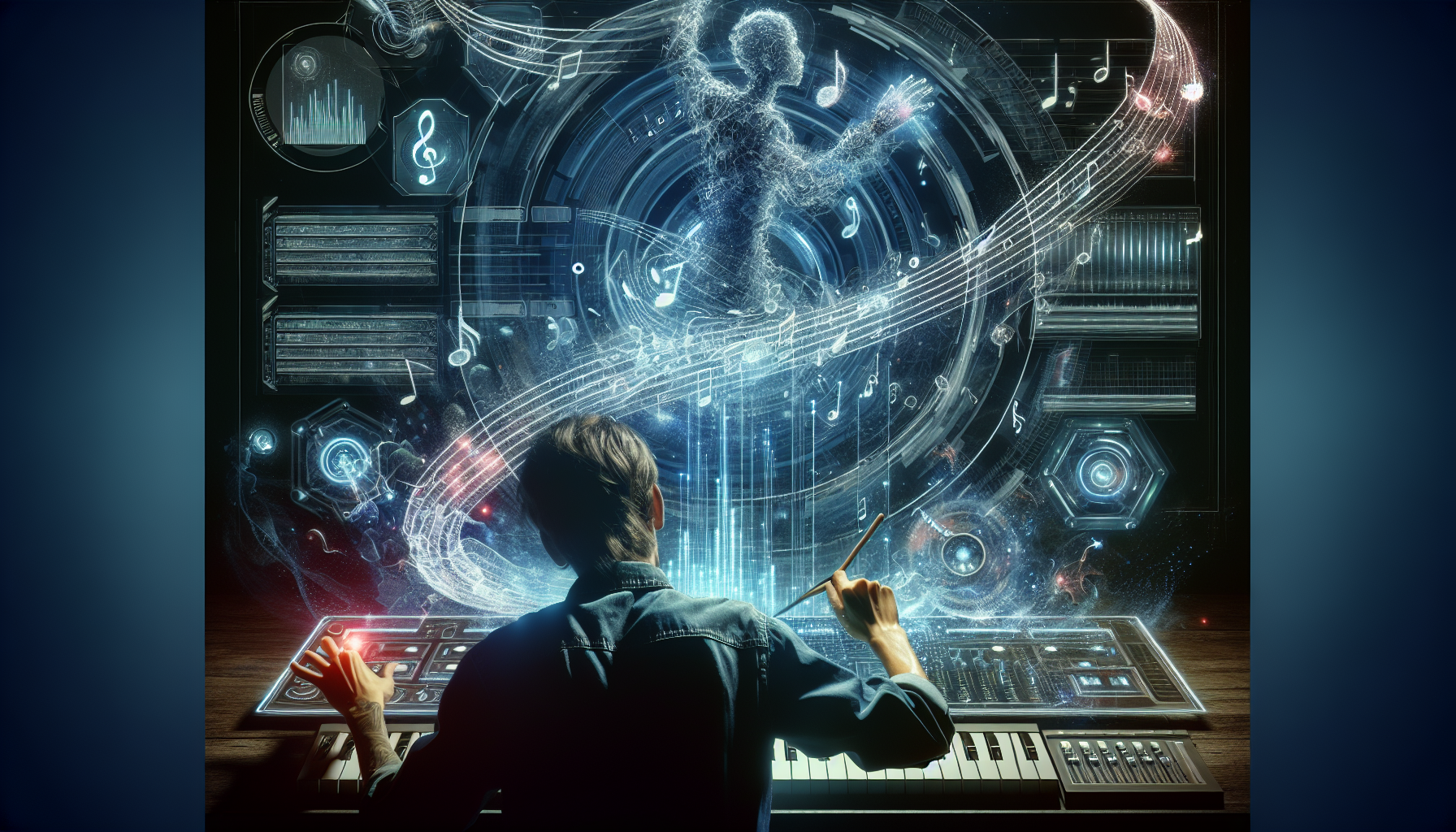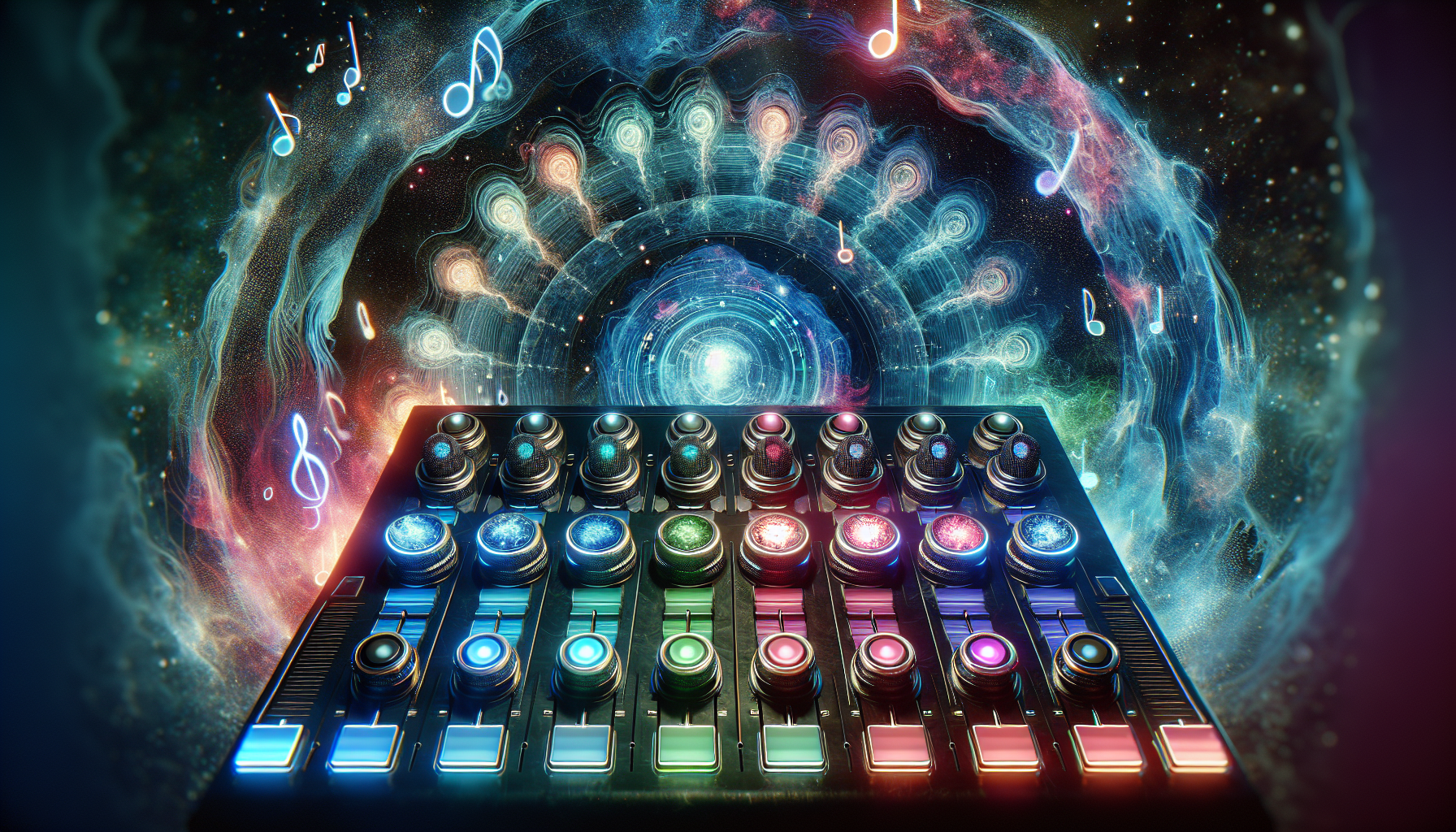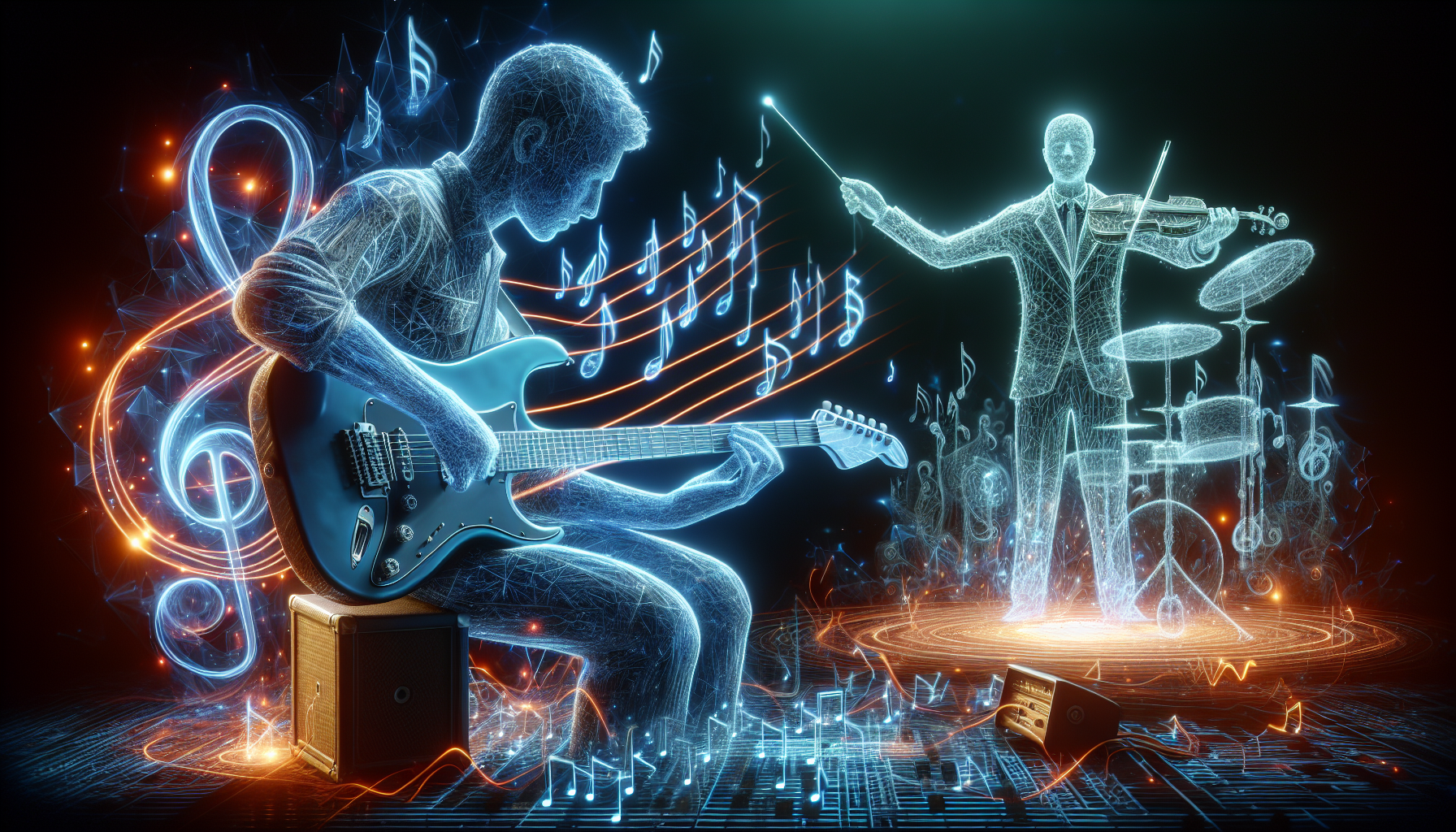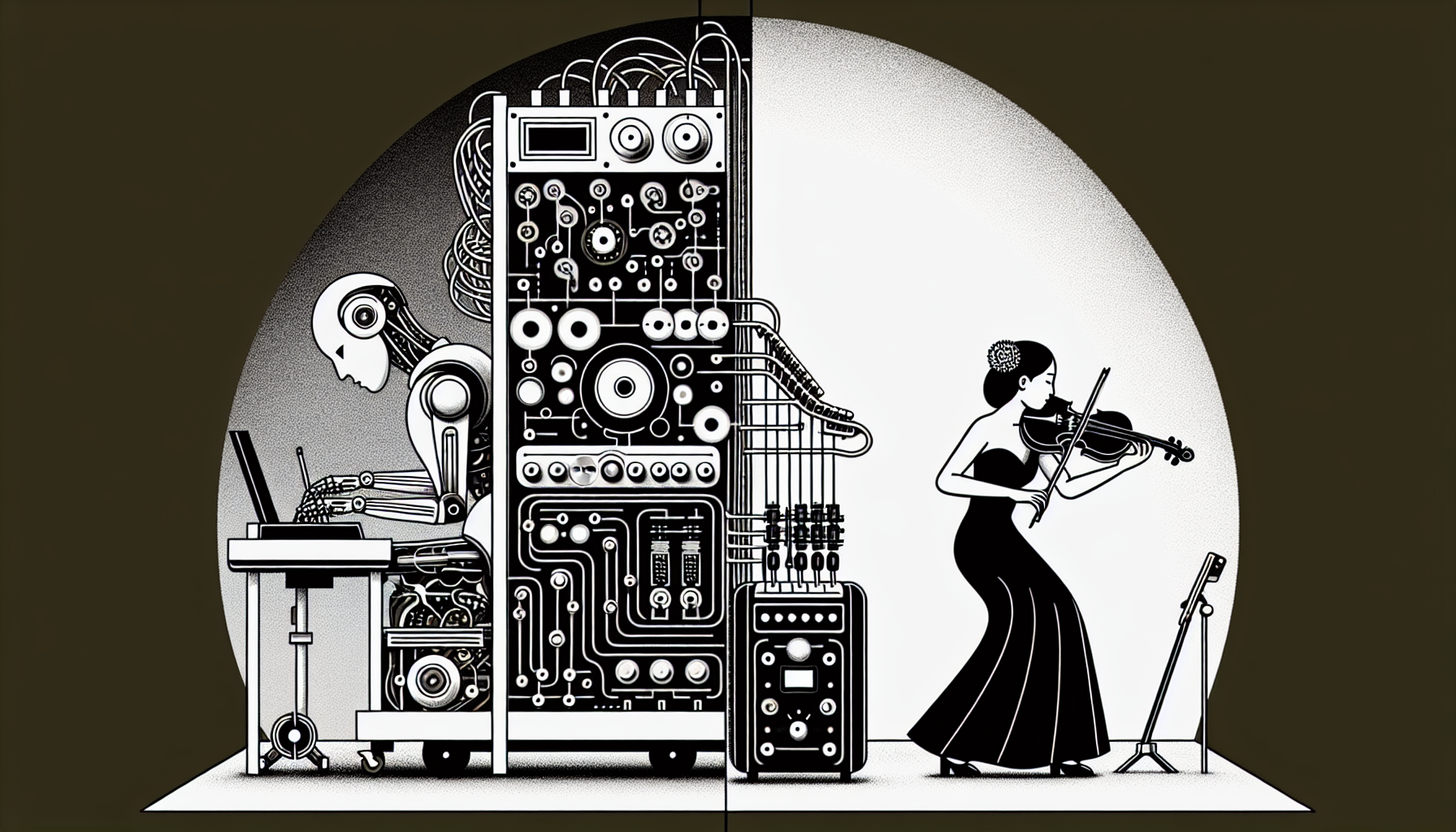Paul
May 15, 2024
Table of Contents |
Artificial Intelligence is reshaping music production, but at what cost? This article breaks down the pros and cons of AI in music production, weighing the advanced capabilities and creative possibilities against the concerns for quality and the future of human artistry in music. Join us as we explore this modern intersection of art and artificial intelligence to determine whether AI hits the right notes or falls flat in the world of music.
Key Takeaways
- AI is transforming the music industry, with estimates suggesting it could make up to 50% of the industry by 2030, providing cost efficiency, enhanced creativity, and accessibility to artists.
- While AI introduces innovative tools for composition, mixing, and mastering, it also raises concerns about authenticity, originality, and the potential reduction in demand for human musicians.
- Balancing AI’s technical innovations with the emotional depth of human artistry is crucial. Producers must address ethical concerns, recognize AI’s limitations, and stay updated on the latest advancements to effectively integrate technology and creativity.
AI in Music Production

No longer a mere buzzword, Artificial Intelligence (AI) is rapidly integrating into all aspects of life, including the music industry. The influence of AI in music production is significant, with an estimated market value of $1.5 billion expected by 2024.
In this AI revolution, artists are not just bystanders but active contributors. A considerable 60% of musicians already utilize AI in their music-making process and an additional 30.1% of producers plan to adopt AI technologies soon. This widespread AI adoption testifies to the opportunities and efficiencies AI brings to music production.
Far from being a one-trick pony, AI is a versatile player in music production. From creating catchy melodies to transforming sounds, AI tools are changing the way of music production. Let’s examine how different AI tools are altering the landscape of music production.
Market Growth and Artist Adoption
The global music industry experienced a seismic shift with the advent of AI, contributing approximately $2 billion in 2020 to the global AI market. But that’s just the tip of the iceberg. The revenue from AI-generated music is forecasted to exceed $6 billion by 2025. These figures reflect the growing acceptance and reliance on AI in music production.
Artists, the heart and soul of the music industry, are not shying away from this technological revolution. Almost 60 percent of artists are already incorporating AI into their music projects. This willingness to experiment with AI technologies is not just about keeping up with the trend, but about pushing boundaries, exploring new sounds, and taking the music creation process to another level. Understanding the pros and cons of AI music is crucial for artists as they navigate these new possibilities and challenges.
❓ Did you know❓
Over 60% of musicians now use AI in their music creation process. Of these, 30.6% use AI for mastering tracks, and 38% for designing album artwork.
~ Ditto
Types of AI Music Tools

AI music tools are like the new-age orchestra, offering a multitude of functionalities. One of the key roles of AI in music production is in composition. AI technology can read and interpret audio samples or MIDI files to create new pieces of music. It’s like having a virtual Mozart at your fingertips!
But the wonders of AI don’t stop at composition. Musicians are employing AI to experiment with new sounds, which involves transforming instrument sounds and creating entirely new ones. Imagine being able to generate a basic melody in under two seconds! This demonstrates AI’s ability to speed up the music composition process and enhance traditional music production methods.
So what are all the types of AI music tools that exist?
AI Composition Tools - 🎼AI composition tools use algorithms to create melodies, harmonies and chord progressions. By analysing massive datasets of existing music these tools create new music based on user input like genre or mood. You can input a simple melody and AI will create full orchestral arrangements or a pop hit in minutes. |
AI Mixing and Mastering Tools - 🎚️Mixing and mastering are key to making music sound professional. AI tools automate this process by adjusting levels, EQ and compression to make tracks sound clean and balanced. These tools analyse the audio frequency spectrum and make precise adjustments to meet industry standards, saving artists hours and hours. |
AI Tools for Sound Design and Audio Processing - 🎨AI in sound design lets you manipulate sound effects, instruments and synths with ease. From creating atmospheric textures to generating specific sound effects, AI sound design tools process audio and shape the tone and timbre of individual instruments. AI can even create entirely new sounds from existing presets or user input. |
AI Tools for Vocal Processing - 🎤Vocal processing tools enhance and modify recorded vocals. AI can adjust pitch, timbre and dynamics to give you perfect harmonies or human-like emotion and expression. These tools also let you achieve vocal effects like autotune, reverb or vocal transformation where the voice can be altered to sound like another person or a completely new character. |
AI Tools for Music Recommendation and Personalization - 📻AI powers the recommendation engines behind streaming platforms. By analysing listener habits and preferences, AI creates playlists, suggests new music and provides personalized listening experiences. These systems use deep learning to understand the emotional and contextual cues behind music choices, to give more relevant recommendations. |
AI Music Tools for Creative Collaboration - 🤝AI tools are connecting artists with technology, allowing for collaborative music making. Musicians from different locations can collaborate in real time, using AI to handle routine tasks like tempo matching, lyric generation or vocal pitch correction. AI’s ability to assist in real-time composition and production helps speed up the creative process. |
Advantages of AI in Music Production

AI transcends its role as a mere tool for music production; it ignites creativity, promotes diversity, and democratizes music creation for all. The array of possibilities AI tools offer for experimenting with new sounds and compositions brings a fresh perspective to music artists. Functioning as an unseen band member, AI strums the chords of innovation and creativity in music production.
Beyond creativity, AI is a game-changer in terms of cost efficiency. By incorporating AI into music production, costs are significantly reduced, making the process of music creation more accessible for artists of all levels. AI’s ability to analyze and master countless tracks ensures optimal sound quality through its understanding of sonic characteristics.
AI also offers an immense advantage in terms of productivity. Working tirelessly, AI enhances availability and assists in the music production process. But all these benefits don’t mean that AI doesn’t have its fair share of challenges. Let’s delve into both sides of the coin and explore the advantages and potential disadvantages of artificial intelligence in music production.
Cost Efficiency and Accessibility
In the world of music production, AI is the great leveller. It provides a significant advantage in terms of cost-effectiveness and affordability. By automating repetitive tasks and increasing efficiency, AI reduces the costs and minimizes errors in music production. The high costs associated with traditional music production processes can be a barrier for many budding artists. This is where AI comes in as a game-changer, helping to automate repetitive tasks and streamline the creative process.
Moreover, AI tools in music production, such as audio editing, mixing, and mastering, promote greater efficiency and save music artists hours of tedious work. This not only enhances productivity but also allows artists to focus more on their creative pursuits. For producers with limited budgets, AI music production tools are incredibly helpful, enabling them to achieve professional-quality sounds and making the music production process more accessible.
❓ Did you know❓
You can save up to 90% of studio costs with AI tools? Check out this blog to find out more information!
Enhancing Creativity and Output
AI’s role in music production extends beyond technical aspects, it also fuels creativity. Adopting co-creative AI systems can propel musicians to amplify their creativity and widen their artistic scope. AI tools can suggest chord progressions, melodies, and harmonies that align with the artist’s style, fostering unique creative explorations.
AI’s role in mastering is also noteworthy. AI powered robots, with their mastering engines driven by AI, can lead to cost reductions by efficiently analyzing tracks for optimal sound quality, thus streamlining the technical aspects of music production. This allows musicians to focus more on their creative projects, thereby enhancing their output.
AI in music provides a platform for collaboration between machine learning components and human creativity, enabling a unique synergy in the music creation process. Understanding the pros and cons of AI music is crucial to fully grasp the potential and challenges of this collaboration. Read more…
Vocal Diversity and Innovation
The AI voice cloning technology has advanced greatly, now providing producers with the opportunity to incorporate a wide range of distinct and adaptable vocal performances into their tracks. It offers new possibilities for enhancing the overall quality and creativity of music productions. Some benefits of AI voice cloning technology include:
- Mimicking a vast range of vocal styles, from sultry jazz singers to booming opera voices
- Expanding the palette of sounds available to producers
- Allowing for greater experimentation and creativity in music production
With AI voice cloning and natural language processing, the possibilities for vocal expression are endless.
The beauty of AI lies in its ability to expand the possibilities of music. By enabling experimentation with a variety of vocal styles and textures, AI is changing the face of music production. Understanding the pros and cons of AI music is essential in this context. The use of royalty-free AI voices provides unique benefits in terms of cost, scalability, and ease of use. This option can be a cost-effective and convenient choice for many businesses. However, not everything that glitters is gold. There are certain challenges and disadvantages of using AI in music production that we need to consider.
Disadvantages of AI in Music Production
"One risk of AI is that you end up with a song-generating machine that makes some beautiful compositions but it never credits any of the things it used to make it."
- Yotam Mann (Never Before Heard Sounds)

In the quest for originality and authenticity, AI-generated music often falls short. AI struggles to capture the nuanced expressions and emotions in music which are innately part of human-performed music due to its inability to access and utilize intelligence like humans. This sometimes results in AI-generated music suffering from an over-processed sound, leading to mixes that might be perceived as over-compressed, thereby decreasing the overall sound quality. One might argue that the absence of human error in AI-generated music contributes to this overly polished sound.
"AI systems are incredible at creating music but the emotional connection, the subtle nuances that a human artist brings, cannot be replicated by an algorithm. The synergy between human creativity and AI can, however, lead to groundbreaking results."
- Rick Beato (YouTuber and Music Producer)
Ethical and Artistic Considerations
The rise of AI in music production also brings to the fore several ethical and artistic considerations. Some of these considerations include:
- Questions about copyright and ownership
- Rights and compensation of session singers and voice actors
- Legal status of AI-generated music, including elements of copyright infringement when AI uses existing songs as inputs
These issues create uncertainty in the music industry and need to be addressed.
As AI grows more sophisticated and capable of replicating human voices, concerns about the potential diminishing role of human musicianship rise. The voice transformation services are provided ‘as is’ and ‘as available’. They are provided using artificial intelligence and machine learning algorithms, trained with legal material. However, users are solely responsible for determining whether the voice transformation services meet their needs and suitability. Therefore it is important to always check the legal compliance of the AI platform you use. Click here to find out more about legal and copyright implications for AI-music.
Job Security for Musicians
Another concern surrounding the rise of AI in music production is job security for musicians. The potential for AI to decrease the demand for human musicians is a cause for concern regarding the industry’s future. AI integration in music production could reduce the demand for human performers and threaten job security for musicians and session singers. Automation through AI can lead to significant job loss implications for the workforce, especially in repetitive jobs, potentially impacting the music industry as well.
"If you make your living by loading up a session, getting the most generic mix in place and not really applying any of your own creativity, then I’m sorry, you are going to be replaced by technology."
- Jonathan Bailey (iZotope)
Balancing AI and Human Talent in Music

In the symphony of music production, AI and human talent must play in harmony. Balancing the efficiency and innovation of AI with the human artistry and emotion is pivotal in music production. While AI brings new tools and opportunities to the table, maintaining the irreplaceable element of the human being in music is essential. The synergy of AI and human intelligence in music production fuses emotional depth with innovative precision, making human resources a crucial aspect of the process.
Despite the challenges, AI is seen as a partner in creativity, inspiring artists rather than replacing them. To remain at the forefront of the evolving music industry, producers must:
- Stay updated on technological advancements
- Integrate AI tools into their work
- Have a deep understanding of AI capabilities and limitations
- Adopt a sound approach towards ethical considerations
- Have a proactive strategy to stay ahead of the curve
This balancing act is crucial for producers to thrive in the industry, complete tasks efficiently, and maintain everyday life.
Understanding AI Capabilities and Limitations
For effective integration in music production, it is crucial to comprehend AI’s capabilities and limitations. AI’s applications range from generating vocals, mastering tracks to composing music. AI brings a practical and rational approach to decision-making in music production, devoid of emotional influence and marked by high accuracy and precision.
AI can also act as a co-creative digital partner, demonstrating its potential to work alongside human musicians during the creative process. This synergy of AI and human creativity paves the way for unique compositions and innovative music production techniques, with minimal human intervention.
Navigating Ethical Waters
Navigating ethical concerns in AI music production is a tricky but necessary task. There is a growing concern that AI’s ability to generate music could infringe on the intellectual property rights of creators, especially when AI algorithms are trained using existing musicians’ work. Ethical considerations also include ensuring that human artists are fairly compensated for their work, especially as the lines between AI-generated and human-created content blur. Understanding the pros and cons of AI music is crucial in addressing these challenges effectively.
Voice cloning presents an ethical dilemma, with concerns about the potential for AI to not only replicate but also overshadow human talent, suggesting a need for regulations to prevent the unethical use of AI in the industry. Addressing these ethical waters requires a balanced approach and a deep understanding of ethical considerations in AI music production.
Staying Ahead of the Curve
In the fast-paced world of music production, keeping pace with change is not just optional but essential. Producers need to stay updated on the latest technological advancements to capitalize on new AI music production opportunities. Understanding the pros and cons of AI music is crucial in this context. Experimentation with AI tools enables producers to investigate innovative production techniques that can enrich their music.
Collaborating with AI in trying new musical styles can lead to unique compositions that might not be possible otherwise. Continuous learning and practicing with AI tools are essential for producers to refine their craft and improve their workflow. By understanding AI’s role in music production and adapting AI technology, producers can maintain their competitiveness in the rapidly evolving music industry. Read more..
Summary
To sum it up, the integration of AI in music production has impacted the industry, offering new possibilities for artists while also posing certain challenges. From enhancing creativity and output to raising concerns about job security for musicians, AI’s impact on music production is profound. Understanding the pros and cons of AI music is essential as we navigate these changes. As we embrace this new era of music production, it’s critical to balance the efficiency and innovation of AI with the irreplaceable human element. After all, music is a universal language that speaks to our emotions, and no AI, no matter how advanced, can truly replace the human touch.
Frequently Asked Questions
All you need to know about Lalals.
What is the role of AI in music production?AI plays a significant role in music production by generating vocals, mastering tracks, composing music, and offering cost efficiency while enhancing creativity and providing vocal diversity. Whether you’re a musician or a music enthusiast, AI is revolutionizing the way music is created and enjoyed. |
What are the advantages of AI in music production?AI in music production offers cost efficiency, enhanced creativity, and vocal diversity. It can automate repetitive tasks, provide unique suggestions, and offer diverse vocal styles and textures. |
What are the disadvantages of AI in music production?The disadvantages of AI in music production include potential quality concerns, ethical and artistic considerations, and job security issues for musicians. AI-generated music may lack the authenticity of human-generated content, posing threats to job security for musicians. |
How can we balance AI and human talent in music production?To balance AI and human talent in music production, it’s crucial to understand AI’s capabilities and limitations, consider ethical concerns, and stay updated on technological advancements to maintain the human element while benefiting from AI’s efficiency and innovation. |
What is the future outlook for AI in music production?AI is expected to play a larger role in music production, with AI-generated music possibly becoming more common. It’s important to maintain a balance between AI and the human touch in music. |
Convert Your Voice with AI
Make your voice sound like those of famous arists.
Join Lalals and use our hyper-realistic voice converter now.